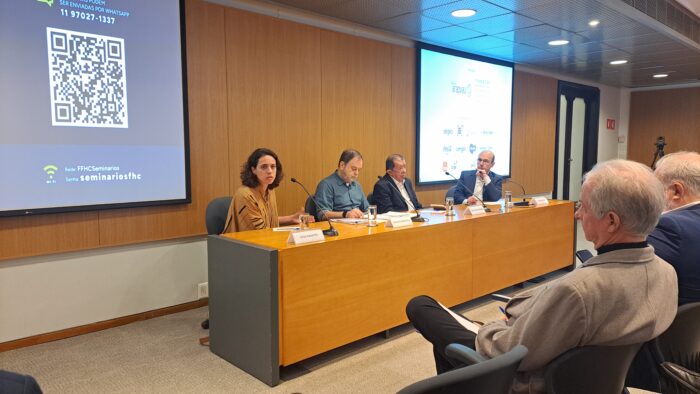
The seminar “Brazil in the Energy Transition and the Role of Oil” brought together experts in São Paulo to discuss the challenge of balancing fossil fuel exploration and climate commitment. Credit: Collection
80% of the energy consumed in the world still comes from burning fossil fuels, with 30% coming from oil, which is the second largest emitter of greenhouse gases, behind only coal. These numbers show the size of the challenge represented by the necessary energy transition to keep Earth’s temperature within manageable limits.
As a producer and exporter country, Brazil needs to qualify a debate: extract oil to meet domestic consumption and exports or slow down the extraction of this fossil fuel to contribute to the planetary need to reduce greenhouse gas emissions? This was one of the questions that guided the seminar “Brazil in the Energy Transition and the Role of Oil”, held in São Paulo on May 22 by the FHC Foundation and the Arapyaú Institute.
In the week when there were advances in the environmental licensing process for oil exploration in the Equatorial Margin of the Amazon Basin, this was the most present theme in the debates, in which David Zylbersztajn, professor at the Energy Institute (IEPUC), Shigueo Watanabe Jr., collaborator of ClimaInfo and specialist in climate change, Flávia Guedes, analyst at the Mapinguari Institute, Jean Paul Prates, chairman of the Center for Strategy in Natural Resources (CERNE), and Roberto Schaeffer, professor of Energy Economics at COPPE/UFRJ, participated.
“This debate is happening at an important political moment. Brazil is about to host COP30 and needs to pay attention to the decisions and commitments it is making and their impacts on the climate agenda,” commented Lívia Pagotto, Knowledge Manager at Arapyaú.
One of the aspects raised at the event was the “information asymmetry” and the difference in power between those who formulate propositions such as exploration in the Amazon Mouth and the populations that will be directly impacted by it. “There is an almost unfair imbalance between the amount of data, tools, and planning that Petrobras and other agencies have and the amount of information available to the people in the territories that will be impacted,” said Flávia Guedes.
For the participants, it became clear that Brazil needs to align its energy planning with its climate planning. “The country needs to have a more coordinated approach to formulating and implementing public policies that unite these agendas, with greater participation from regulatory agencies as well,” said Pagotto.
The full seminar is available here.